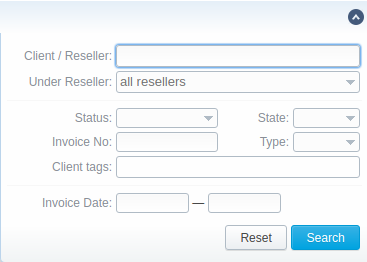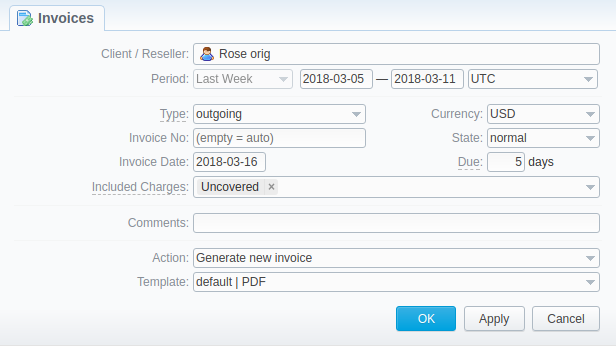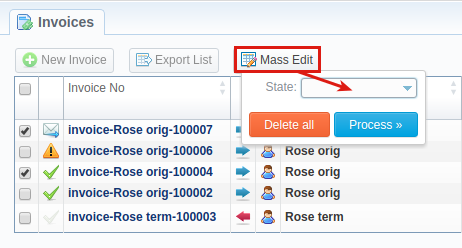Invoices
Invoices list
Since an Invoice is an ultimate tool for controlling the volumes of provided services and their prices, the Invoices section of JeraSoft Billing is a staple instrument for the management of your business. It allows you to create and administer all outgoing and incoming invoices. By clicking on the Download  icon, you can export and view the respective invoice. By using the Export List option, you can download a currently stored list of invoices in a .csv format.
icon, you can export and view the respective invoice. By using the Export List option, you can download a currently stored list of invoices in a .csv format.
The section is presented in the form of a table of all invoices with the following columns:

-
Invoice No: Number of an invoice
-
Client/Reseller: Name of a respective Client or Reseller along with the identification number.
tipYou can create an invoice for a root Reseller
-
Interval: Interval for invoicing
-
Net Total: The invoice sum, excluding the taxes
-
Taxes: The taxes amount if applicable
-
Total: The total sum of the invoice
-
Due Date: Determined due date of invoice
-
Invoice Date: Date of invoice creation
tipWhen you leave the Invoice Date field empty, it will be identical to the time of invoice creation. In case you determine it, the system sets the midnight of a specified day.
Functional buttons and icons, presented in the section are as follows:
| Button/Icon | Description |
|---|---|
 | Allows creating a new incoming invoice in the system |
 | Allows creating a new outgoing invoice in the system |
 | Allows exporting a list of invoices in a .csv file |
 | Allows managing the state for the selected invoices in the list |
 | Indicates normal state meaning that a respective invoice was paid in full. If the invoice is not fully paid, the icon will be grey |
 | Defines to verify state meaning that this invoice is waiting to be checked before it is sent to a client |
 | Defines to send state meaning that invoice is in sending queue |
 | Indicates outgoing invoice |
 | Indicates incoming invoice |
 | Allows downloading a respective invoice file in a .csv format |
 | Allows downloading an xDR file, if one is attached to invoice. If there are no attached xDR files, the icon will be grey |
 | Allows deleting a respective invoice from the list |
Advanced search
To filter data in the section, use the Advanced Search drop-down menu, which can be accessed by clicking a blue downward arrow  icon in the top right corner of the screen.
icon in the top right corner of the screen.

Creating a new Invoice
Invoices are created through the New Invoice button. When you click on it, a pop-up window shows up:

-
Client/Reseller: Name of the Client or Reseller
-
Interval: Define a period of statistics that will be included in an Invoice
-
Type: Specify the type of Invoice: Outgoing or Incoming. By default, the Type is set for incoming for your convenience as that's usually the case for manual Invoices creation. Outgoing Invoices are usually automatically generated.
-
Currency: Select Invoice currency from a drop-down menu
-
Invoice No: A number of an Invoice. The number length can't exceed 200 symbols
-
State: Select the state for a new invoice:
- "normal" - use this state to indicate that an Invoice is paid
- "to send" - use this state to indicate that an Invoice is paid, but not verified yet
- "to verify" - use this state to indicate that an Invoice is created, but has not been sent to a Client yet
-
Invoice Date: Specify the actual invoicing date
-
Due (days): Define a number of days when an Invoice is expected to be paid
-
Included Charges: Select the type of charges for invoices:
- "uncovered" - all charges that are not included in any previous Invoice
- "covered" - all charges already included in the previous Invoice
- "pending" - all pending charges
noteThese charges don't include calls. Therefore, call charges will be added to any invoice regardless of the Included Charges settings.
tipIt's not possible to include a charge twice with standard settings. To re-include an already used charge in the invoice, you need to combine uncovered + covered parameters in the Included Charges field.
-
Comments: Specify additional information if necessary
-
Action: Select one of two available actions:
- Generate new invoice - A new Invoice will be generated, based on predefined templates in the Invoices Templates section. To select a target template, select it from the drop-down menu in the Template field.
- Attach existing invoice - If this option is selected, the following additional fields are displayed:
- Attach Invoice - allows the user to attach additional Invoice;
- Attach xDR - allows attaching additional xDR file in a .csv format;
- Events Amount - indicate a total amount, charged for services (calls, SMS, data, etc.) traffic;
- Other Amount - indicate a total amount, charged for any other events (e.g., package fees).
-
Template: Select the needed Invoice Template
All automatically created Invoices will have "to verify" state. To send an Invoice to a Client, you will need to change the state to to send manually!
When generating Invoices under one Reseller for different Clients, it is recommended to wait till the Invoice for one Client* will be generated and only after that start generating the other one (avoid generating them simultaneously). That is important to avoid the situation of having invoices with an identical number in the system.
Mass editing
To change Invoices state easily, use the Mass Edit button. First of all, you need to select invoices, for which a state should be changed, then specify it from a drop-down list of all states, and click the "Process" button for applying the change. Also, using the following window, you may delete all marked Invoices by clicking "Delete all".

Please note:
- While generating invoices, the system sorts packages in invoices by numbers. The names of packages could include numerical symbols. Please use numerical symbols like 001 name, 002 name, etc. in the names of packages, and avoid names with special symbols like %001 name, -001 name.
- The currency rate of extra charges will be taken on the date of the charge, not on the date of the invoice.
You can include specific charges by ID in the Invoices (only for API). You can check the ID for extra charges and packages in the Transactions section. Then, you need to add the chargeslist variable with respective values in the _Parameters field of the API Testbed section:

Differences in totals
You may have noticed that while creating different reports, such as a Summary Report, xDRs List, etc., and then generating an Invoice, you can get different totals. Here is a little background on what makes those differences.
Due to the Included Calls (Attach xDRs list to the invoice settings) option in the Invoice Templates, you can create an Invoice based on different types of calls:
- All payable - includes calls with any duration that have non-zero costs and use packages;
- Non-zero payable - includes calls with a non-zero duration that have any cost and use packages.
Therefore, Invoice totals depend on the selected parameters and settings. For example, whether to include calls with any cost/duration/package or not. However, when you generate a report, the statistics are usually based on all calls. As a result, a difference between Invoice and report totals appears; even though an Invoice may have completely another totals vs report data.
The invoice and report totals could differ if you made a rerating for a previous invoice period or the statistics were updated.
Besides, take note of currency settings: there you may specify the number of symbols that will be displayed in all reports with cost and rate values in the statistics. Also, it will be shown in the Invoices, except total values (totals always have 2 decimal places in invoices).
- Rates precision - the number of decimal places for rates formatting.
- Details precision - the number of decimal places for detailed monetary values formatting. This precision is used for all reports, except for an xDR report.
- Totals precision - the number of decimal places for total monetary values formatting.
For more details on rounding and totals calculation options, see Invoice Templates.
Transactions distribution in Invoices
Here is how the Transactions are distributed:
- charges with positive fees go to Outgoing Invoices,
- charges with negative fees go to Incoming Invoices,
- The zero-line items are omitted in the Invoices.